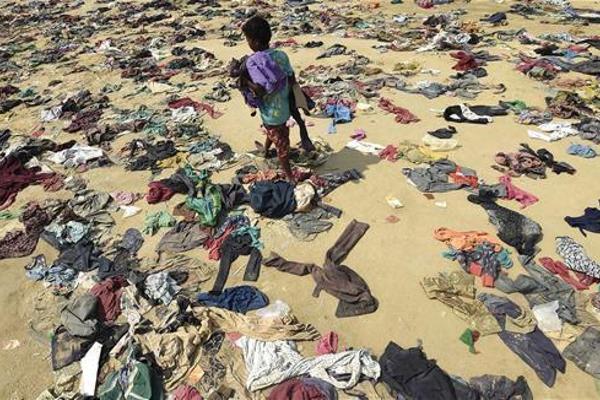Aid group warns of death among Rohingya in Bangladesh
COX'S BAZAR - Reuters


Nearly 410,000 members of the Rohingya Muslim minority fled from Myanmar's western Rakhine state to Bangladesh to escape a military offensive that the United Nations has branded a "textbook example of ethnic cleansing.”
"Many people are arriving hungry, exhausted and with no food or water," Mark Pierce, Bangladesh country director for the Save the Children aid agency said in a statement.
"I'm particularly worried that the demand for food, shelter, water and basic hygiene support is not being met due to the sheer number of people in need. If families can't meet their basic needs, the suffering will get even worse and lives could be lost."
Bangladesh has for decades faced influxes of Rohingya fleeing persecution in Buddhist-majority Myanmar, where the Rohingya are regarded as illegal migrants.
Bangladesh was already home to 400,000 Rohingya before the latest crisis erupted on Aug. 25, when Rohingya insurgents attacked police posts and an army camp in the western state of Rakhine, killing a dozen people.
Pierce said the humanitarian response needed to be rapidly scaled up.
"That can only be done if the international community steps up funding," he said.
Rights monitors and fleeing Rohingya say Myanmar security forces and Rakhine Buddhist vigilantes responded to the Aug. 25 insurgent attacks with what they say is a campaign of violence and arson aimed at driving out the Muslim population.
Myanmar rejects that, saying its security forces are carrying out clearance operations against the insurgents of the Arakan Rohingya Salvation Army, which claimed responsibility for the August attacks and similar, smaller, raids in October.
The Myanmar government has declared the group a terrorist organisation and accused it of setting the fires and attacking civilians.
Bangladesh border guards said the flow of refugees leaving Myanmar had eased off over the past day, apparently because bad weather had discouraged people from taking to boats to reach Bangladesh.
Heavy rain has turned roads into mud, with refugees huddling under shelters of bamboo and plastic sheets beside them.
Bangladeshi authorities said they had started moving an estimated 100,000 Rohingya living by the roads to camps designated as aid points.
"We're not allowing any distribution to anyone from the side of the road," said district government official Kazi Abdur Rahman. "We want to convince them there's everything in the camp and nothing here."
A big new camp is planned but it is unclear how long it would take to build.
“People are living in these muddy, awful conditions. You have to get them to some sort of space where aid can be delivered," said Chris Lom of the International Organization for Migration.
"Clean water and sanitation can only be delivered in a structured environment."
There is no sign that violence has stopped in Myanmar, with smoke, apparently from burning villages, seen as recently as Sept. 15, meaning more refugees are likely to cross.
Human Rights Watch said satellite imagery showed 62 Rohingya villages had been torched since the violence erupted.
Myanmar says more than 430 people have been killed, most of them insurgents, and about 30,000 non-Muslim villagers have been displaced.
Myanmar government leader and Nobel laureate Aung San Suu Kyi has faced a barrage of criticism from abroad for not stopping the violence.
The military remains in full control of security policy and there is little sympathy for the Rohingya in a country where the end of army rule has unleashed old animosities, and the military campaign in Rakhine State is widely supported.
Suu Kyi is due to make her first address to the nation on the crisis on Sept. 19.
Her foreign supporters and Western governments that backed her campaign against military rule, and see her as the best hope for Myanmar's future, will be hoping to see her make a commitment to protect the rights of the Muslim minority.
Suu Kyi's supporters at home could be disappointed if she is perceived to be caving in to foreign pressure and taking the side of a Muslim minority blamed for initiating the violence.
The United States has called for the protection of civilians and a deputy assistant secretary of state, Patrick Murphy, is due in Myanmar this week.
He will travel to Sittwe, the capital of Rakhine State, to meet government officials and representatives of different communities, including Rohingya, but he is not seeking to travel to the conflict zone in northern Rakhine State.
The military has called for unity on the issue.
The political party founded by retired officers and trounced by Suu Kyi's party in the 2015 election, could be expected to take heart to see her support eroded by the crisis.
